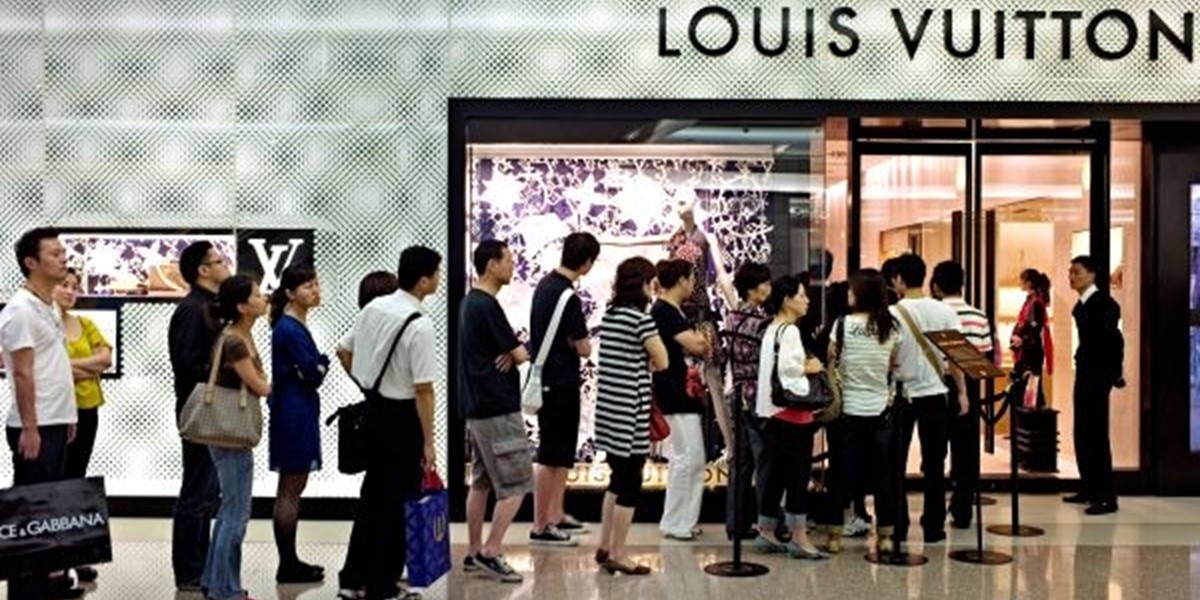Leona Tan Siew Hoon graduated from Indiana University Bloomington, US, majored in Finance and International Business. She started her career as an analyst in a financial-data company in the US. Upon her return to Singapore, she spent a few years in corporate finance before dedicating herself to working as an equity analyst at a brokerage firm in 2004. She joined a large Singaporean asset manager in 2007 and was involved in various roles such as portfolio manager for global and China-India equities funds. She joined Econopolis Singapore Pte Ltd in April 2017 and was responsible for stock selection in the emerging markets funds until 2023. Since then, she has been advising Econopolis on emerging market equity markets as an associate of Sunline (Singapore).
Big changes in Chinese luxury e-commerce

Chinese online luxury shopping
The luxury fashion house Kenzo is to open a standalone store on Alibaba Group’s Tmall Luxury Pavilion, a dedicated platform for luxury and premium brands. This makes Kenzo the first LVMH-owned fashion label to open a flagship store on Tmall even though the luxury group has already introduced a growing range of its beauty, accessories and wine subsidiaries on Tmall and the Pavilion, including Guerlain, Givenchy, Fresh, Benefit, Rimowa, Tag Heuer, Zenith and Moët Hennessy to engage online consumers.
Kenzo is perhaps best known for its iconic Tiger Kenzo embroided or printed logo. To celebrate the occasion, the brand debuted its kung fu-inspired Chinese New Year capsule collection on the Pavilion, including everything from T-shirts and jumpers to backpacks and trainers that feature Kenzo’s Kung Fu Rat character, a nod to the zodiac animal of the new lunar year. The brand is also offering some of its first Pavilion customers special-edition boxes for purchases as well as interest-free, flexible payment options via Ant Financial’s consumer-lending service. Ant Financial, formerly known as Alipay, is an affiliate of Alibaba and is the highest valued FinTech company in the world with a valuation of US$150 billion.
Certainly, LVMH is not the only luxury giant to launch flagship stores on Alibaba’s e-commerce platforms. Bottega Veneta is the second brand from French Kering Group, one of the world’s three largest luxury groups, to open a store on Tmall. Also Swiss luxury group Richemont, which owns Cartier and Chloé, has formed a joint venture with Alibaba last year to bring luxury brands to online customers in China. The partnership sees Richemont-owned online retail sites Net-a-Porter and its men’s site, Mr Porter, launched on Alibaba’s Tmall Luxury Pavilion. As part of the deal, they are offering more than 130 luxury and designer labels. And early this year, Cartier has opened a flagship store on Tmall Luxury Pavilion, making it the first Richemont-owned business to launch a standalone boutique on Alibaba’s platform.
What about fake products
The joint venture between Richemont and Alibaba is a significant shift for the luxury goods industry, which was a laggard in embracing online retail and has regarded Chinese ecommerce with suspicion amid concerns it fosters counterfeiting. When addressing the risk of counterfeit luxury goods being sold on Chinese websites, Johann Rupert, Chairman of Richemont said the company “would never think of entering a situation where we felt uncomfortable”. “We have looked at their systems and what they have done to combat counterfeiting and I am satisfied that this is a very, very, very low risk scenario,” he added.
Separately, John Idol, CEO of American fashion label Michael Kors called Alibaba’s Tmall Luxury Pavilion “the perfect venue for us to communicate Michael Kors’ brand vision”, as the company launched Michael Kors on Tmall last year. The company struck a different tone about Alibaba when they previously called Alibaba “our most dangerous and damaging adversary” during a comment made in 2016 in response to the spread of counterfeits on Alibaba’s online marketplace, Taobao.
Alibaba versus Amazon
All these are a striking contrast to the news of Nike leaving the Amazon platform after a two-year relationship. “As part of Nike’s focus on elevating consumer experiences through more direct, personal relationships, we have made the decision to complete our current pilot with Amazon Retail,” the company said in a statement. Nike reportedly had enough of the fake listings, which left the official Nike products buried on the sprawling website, according to Bloomberg. Some big brands shun Amazon’s platform, where counterfeits flourish, unauthorized sellers undercut prices and thousands of fake reviews.
On top of this, Swatch Group CEO Nick Hayek told the Wall Street Journal in 2017 that the watch company’s partnership with Amazon hit a wall because it failed to agree to a “commitment that Amazon proactively police its site for counterfeits and unauthorized retailers”. Nick Hayek told CNBC in 2018 that Alibaba does better at fighting fakes than its American counterpart, Amazon. “If I look what Alibaba is doing and all these they are trying to make a service to the consumer and to earn money. And they are fighting actively against fakes. This Amazon is not doing,” he said. Commenting on whether Amazon is delivering added value for consumers, Nick Hayek conceded that it was “in a way, yes, they deliver a product”.
Alibaba’s Tmall and the Pavilion
The turnabout illustrates how the fashion industry, which once eyed Alibaba with suspicion, is now flocking to it in order to reach China consumers. Hard work probably does pay off! Alibaba has taken tremendous steps to fight the matters, as well as heighten shoppers’ experiences through its deep consumer insights and rich technology and marketing tools. It has its own task force that inspects the site for fake goods, and Alibaba founder Jack Ma openly talks about fighting against counterfeits. The company spokesperson also added that the company has “developed best-in-class systems to protect [intellectual property] and battle the scourge of counterfeiting”. Most importantly, “Alibaba is committed to supporting the growth and innovation of global brands,” said Mike Hu, head of Tmall Fashion, Luxury and FMCG.
Business-intelligence firm Gartner L2 noted in a recent report that 51% of 45 top global fashion brands it tracks in an index now have official flagships on Tmall. It’s a big uptick from previous years. Launched in 2017, Tmall Luxury Pavilion now offers over 150 brands with products ranging from apparel and beauty items to watches and luxury cars. Brands include Chanel, Cartier, Bottega Veneta, Valentino, Alexander McQueen, Burberry, Tod’s, Stella McCartney, Marni, Moschino, Michael Kors, MCM, Breitling and Maserati. In September 2018, Richemont’s e-commerce platform, Net-a-Porter, also launched a flagship store on the Pavilion, offering the site’s shoppers a selection of items from designer and luxury brands such as Balmain, Jimmy Choo, Chloé and Montblanc. Alibaba’s Tmall has become the luxury fashion’s gateway to China.
How big is the luxury market in China
Everyone knows that China is clearly shifting towards slower but more consumption-led growth. Consumption’s contribution to Chinese GDP rose to 66% recently from 46% a decade ago. In 2018, Chinese consumers at home and abroad spent 770 billion RMB (US$115 billion) on luxury items, with each luxury-consuming household spending an average of 80,000 RMB per year. The Chinese consumer is already the world’s biggest luxury consumer, representing 32% of overall luxury sales versus 22% for U.S. consumers, who come in second. But what matters even more is that its share will continue to rise and probably cross the 50% threshold in ten years.
Who is the Chinese luxury consumer
China’s post-‘80s consumers (born in the 1980s) are still the largest luxury spending group, powering the Chinese luxury market. Consisting of 10.2 million luxury consumers and spending an average of 41,000 RMB per person each year on luxury, they accounted for more than half the total spending on luxury by Chinese consumers in 2018.
Chinese consumers are different from those in Western markets, and they are changing. After decades of luxury consumption in China driven by “socially enabling” products (like watches targeted to mature men), we are now observing the rise of a new young, high-spending segment, largely composed of women and more oriented towards handbags, fashion and accessories. The average age of the luxury consumer in China is about 15 years younger than their counterpart in the U.S. and 10 years younger than the average European luxury consumer. They are also more demanding and are not yet loyal to a particular brand. They are very educated on product and pricing information, and they adjusted seamlessly from having a very small assortment and limited variety to having the choice of everything at once.
As a result, Chinese consumers have become the most sophisticated consumer group in the world, demanding quality, personalization, innovation and new technology from retailers. They search unique and high-quality products. They embrace customization and seek unique experiences when they shop. Old patterns, such as the lack of sophistication and the preference for garish designs, have shifted to a genuine appreciation for brands’ heritages.
